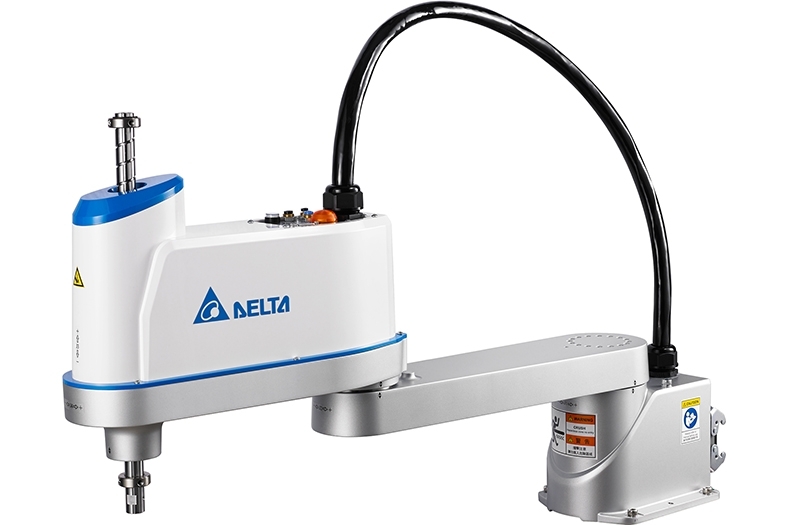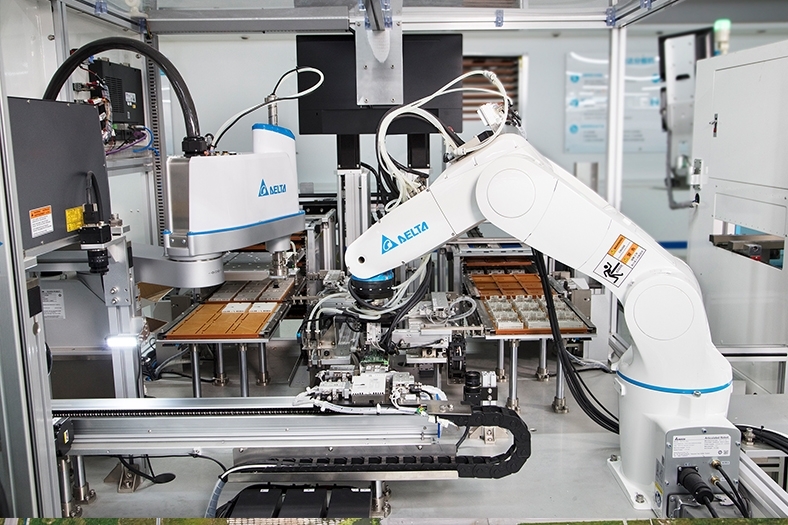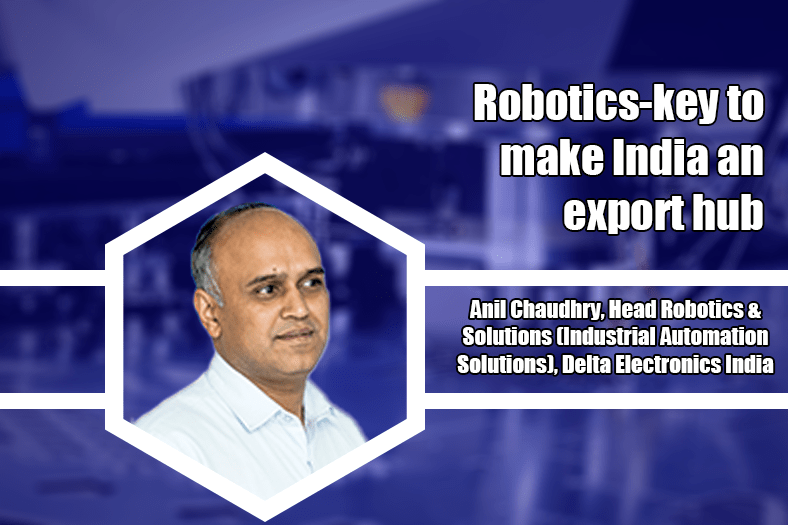Robotics – key to make India an export hub
May 4, 2021 12:34 pm
With India taking aggressive steps to become a global export hub, robotics will emerge as a necessity to meet the growing volumes while ensuring quality, says Anil Chaudhry, Head Robotics & Solutions (Industrial Automation Solutions), Delta Electronics India. In an insightful interview, he shares the current trends and challenges in Indian robotics market, the importance of skill development, and future vision and growth plans. Excerpts:
In your observation, what are the emerging trends for robots in the Indian market? What kind of traction are you seeing in the space?
The robotics market in India has been on the steady rise and is looking to gain significant momentum in the coming years. Indian market is consuming industrial robots, collaborative robots, and service robots. However, the market is currently dominated by industrial robots, which occupies the market share of 80 percent to 85 percent. That said, collaborative robots are gaining the market demand and service robots are being discussed and talked about extensively in India. Medical industry will primarily lead the consumption of service robots considering the benefits visible to this industry.
While the consumption of collaborative robots is at a nascent stage, it is getting a lot of attention from both automotive and general industries. Especially in the current pandemic time and post-COVID, human touch is going to be limited across the industry. The added advantage of collaborative is to have more robots per square meter of the working area and the same is true for Delta’s SCARA robots.
Which key industries are deploying robots currently? From which other segments are you expecting the demand in the coming years?
In terms of robotics deployment, the automotive sector has always been a frontrunner and the demand will continue to increase both for passenger cars and two wheelers. Further, we are seeing significant demand from other sectors too. For instance, Food and Beverage is one of the key sector that has witnessed strong traction during COVID-19 times. Pharma is another sector given extensive packaging requirements.
Going ahead, electronic manufacturing will emerge as the prime sector for robotics deployment. The sector is seeing significant investment and government push. EMS companies need to upgrade themselves not only to have the flexibility to produce various components in the line but also to produce high-reliability products. Hence, robots will become imperative. Right from assembly, inspection and repairing, everything will be powered by the robots.
We, at Delta, are very bullish on the opportunities and are well-equipped to meet the unique requirement of these sectors.
In your view, has COVID-19 strengthened the case for robotics? Is robotics a necessity in the post- COVID world?
Definitely, the pandemic has fuelled the adoption of robotics. It has made people realise limitations of servicing and supplying with 100 percent human dependency. Also, with consumption slated to increase in certain sectors, such as F&B, pharma and electronic manufacturing, adopting robotics will emerge as a necessity to meet the volumes while ensuring product reliability. Apart from this, dramatic changes in the product lifecycle are further catapulting the demand for robotics to ensure the right products can be made available at the right time. COVID-19 has also significantly added to the demand for high quality routers, modems and DTH connection. The increased localised manufacturing of these products will also spur growth in robotics.
Tell us about Delta’s products in the space. Delta is a major player in the robotics space, not only providing products but end-to-end solutions for the manufacturing segment. Our product range includes SCARA Robots, Articulated Robots and Robot Controllers with Servo Drive integrated. Our robots have been designed to support smart manufacturing and power smart factories.
Delta puts a lot of emphasis on ensuring the right quality. We work closely with customers to understand their pain points and requirements and assist them through deployment and training. Our product line has been specifically designed to meet the unique requirements of different customers right from micro industries to large industries and meet their goals of flexible manufacturing and increased productivity.
What would you describe as your USP in the robotics space?
At Delta, we focus not only on providing robots but also providing the application robots. Our product line has been designed to accomplish a range of industry applications, such as pick and place, screw driving, insertion, glue dispensing, load and unload, stacking, inspection, soldering, palletising, assembly, etc., to make the overall usage of the robots flexible to the customers. Our SCARA robots can handle 3 kg to 12 kg payload and can cater to 95 percent demands.
We have a solid software range around our robots to derive maximum benefit from the deployment. At Delta, innovation is at our core—we continually focus on making our robots more intelligent and developing new robots to meet the industry demands. We are also working on our collaborative robots range. Further, we have no limitation in shaking hands with the third-party vision product manufacturer, in case there is a customer requirement.
How would you rate India’s maturity in industrial robot adoption vis-à-vis world factories?
When we talk about robotics adoption in the India market, I would say we have a long way to go. As per International Federation of Robotics published in 2019, India ranks 11th worldwide in terms of annual installations of industrial robots. Also, the maturity level for other types of robots is further low.
At Delta, we are working extensively to raise awareness by participating in various government and non-government activities and collaborating with MSME Ministry. We are demonstrating how robotics can transform various industries and especially reach out to the micro industries.
Also, as an industry, we need to come together to change the general perception that the robots are going to take away jobs. We need to highlight the new job opportunities that robotics can create across industries.
According to you, what are the current challenges in the robotics market in India?
The biggest challenge is the lack of skill set to run and utilise the robots to the best capacity. We need to focus on developing talent and upskilling the current workforce to keep abreast with the latest technology. This is of utmost importance as unless we utilise robotics, India cannot emerge as the export hub. Robotics is integral to realise the Make In India vision and will prove crucial in producing high-quality, cost-efficient products.
upskilling the current workforce to keep abreast with the latest technology. This is of utmost importance as unless we utilise robotics, India cannot emerge as the export hub. Robotics is integral to realise the Make In India vision and will prove crucial in producing high-quality, cost-efficient products.
For example, around a decade back, India was exporting limited automotive components in European and American market. However, with the deployment of robots, India has now emerged as a prominent automotive manufacturer to export to these markets. Clearly, the right infrastructure and the right usage of the infrastructure are key. So, developing skill set and upskilling the existing workforce is imperative, and we are all working towards that..
How is Delta contributing towards skill development?
At Delta, we are taking several initiatives for skill development. We have joined hands with the Government of India sponsorship program for The National Small Industries Corporation (NSIC). We have deployed Delta robots in two of their centers in North India, wherein we are encouraging micro and small industries to experience the technology. This helps them get a first-hand experience on how it works and understand its effect.
Apart from this, we conduct online classes for MSMEs and also our channel partners. We are conducting several programs where we are highlighting how robots can make our jobs easier, how they can improve efficiency, productivity and quality. These partners then become our extended arms.
Is the demand for industrial robots limited only to large factories or even small shops are showing readiness to adopt the trend?
Robots were earlier deployed only by MNCs or large industries, as they had a lot of know-how coming from parent plants. However, the scenario is completely changing now. Today, even small shops and micro industries are tapping into the power of robotics. We are also supporting these industries by not only providing automation in the most cost-effective way but also providing training. Once the customers start seeing the advantage, they themselves want to understand more applications. So definitely, micro industries are coming forward and asking for solutions.

Could you illustrate benefits derived from robot deployment with a case study?
Since our foray into the Indian market, we have showcased several successful cases in the industry. One of the applications was for the pharmaceutical industry with the parent plant in Japan. With our robots, the company was able to produce more sline bottles and ensure capping on the sline water. The company was able to optimise the process and improve productivity by 15 percent.
Our robots also proved instrumental for a screw tightening application for an MNC working on a product related to the 5G network in India. This was a very challenging project as the number of screws were very high and each screw had to be tightened at a particular torque. With our robot, the company has ensured accuracy and reduced the rework by 12 percent.
Another application was for the equipment manufacturer for the pharma industry. We automated the entire inspection process of the medical device. With the help of SCARA robots and vision sensors, we were able to optimise the process as per customer requirement and helped the company meet the cycle time of 7 seconds.
These are few of the key applications we have done in the recent times. However, there are many other critical applications which we are doing for the pharma, automotive, railways, print and packaging, F&B, machine tools, rubber and plastics, metal fabrication and electronics industries.
What is your future vision and growth plan for the robotics division?
We are eyeing huge opportunities and have aggressive growth plans for the electronic manufacturing industry and laser-based applications. We are investing internally to gain application know-how in the electronic manufacturing industry and grow our product lines. We are focusing on modular manufacturing cells to meet the different demands of the industry. At Delta, we have a strong push on quality so we are coming with vision guided robots, which can prove beneficial in quality inspection—inline or offline.
Laser-based application has been a huge focus for us. Initially, we were focusing on automotive, now we are also targeting the EV segment.
—-
“Developing skill set and upskilling the existing workforce is imperative, and we are all working towards that.” – Anil Chaudhry, Head Robotics & Solutions (Industrial Automation Solutions), Delta Electronics India.
Cookie Consent
We use cookies to personalize your experience. By continuing to visit this website you agree to our Terms & Conditions, Privacy Policy and Cookie Policy.


















 English
English Hindi
Hindi